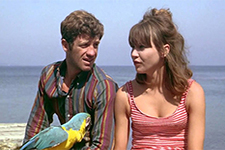Pierrot le fou
|  Jean-Luc Godard’s Pierrot le fou was the prolific writer-director’s tenth film in seven years, and it cemented a pronounced shift in his cinematic sensibilities that had been in a constant state of evolution since he exploded onto the international stage with Breathless (À bout de souffle, 1960), one of several sparks that fully set the French New Wave ablaze. Throughout the 1960s he had experimented with Hollywood conventions like genre (science fiction, musicals, crime films), color, and widescreen, as well as the star system (his 1963 film Le Mépris starred Brigitte Bardot). He was also beginning to move toward a more radically disjunctive form of cinema, moving past Breathless’s jump cuts and genre revisionism into a terrain marked by direct address, fragmented narrative, and experimental mixtures of imagery, words, and diegetic collapse, all of which was fueled by his growing political sensibilities. Pierrot le fou is the gateway that would eventually lead to his “essay films” Masculin Féminin (1966) and Made in U.S.A. (1966) and his crowning masterpiece, Weekend (1967), elements of which are clearly evident here. Reunited with his Breathless and A Woman is a Woman (Une femme est une femme, 1961) star Jean-Paul Belmondo, who, in Andrew Sarris’s words, has a “too-many-drinks-and-cigarettes-the-night-before-this-morning face” (he looks demonstrably older than 34), Godard riffs on Obsession, a noir-ish 1962 novel by the American crime writer Lionel White, whose Clean Break was earlier adapted by Stanley Kubrick as The Killing (1956) and who Quentin Tarantino posthumously credited as an inspiration for Reservoir Dogs (1992). Godard leaves most of White’s plot in the dust as he spins a wild and improbable lovers-on-the-run tale that is as genuinely romantic as it ironically detached. It is, like so many of Godard’s best works, a paradox that forces you to constantly engage and think and question what you’re watching. Belmondo plays Ferdinand Griffon, a bored husband, father, and aspiring artist who ditches his staid Parisian life to run off with the family babysitter, Marianne Renoir (Anna Karina), who also happens to be his ex-girlfriend. They take off without much of a plan, which is kind of how the film feels, as well: improvised, spontaneous, made-up along the way. There is both rhyme and reason, but not in the ways that you would typically expect. At various moments the film turns into a musical; at other times it plays like a standard criminals-on-the-lam road movie; and at other points it detours into political theater, absurdist satire, and Brechtian distanciation. That makes the film sound like a mess, and, in a way, it is—a uniquely Godardian mess, which means that you can sense the order through the chaos, even if you can’t always put your finger on what, exactly, Godard is after at any given moment. Much of his work is usefully understood via a response he gave to a question posed by cinematographer Caleb Deschanel in 1968: “I think you are looking for too many explanations for things, too many comments about things, but they are just there. There is nothing to explain.” What we can know for sure, though, is how gorgeous the film looks (the cinematography is by Raoul Coutard, who shot virtually all of Godard’s early films, as well most of François Truffaut’s). Saturated in garish primary hues that give each frame the look and feel of a comic book panel, Pierrot le fou is a love letter to the visual arts, and Godard suffuses the film with insert shots of paintings from Renoir and Picasso, as well as pop art, magazine advertisements and billboards, and neon signs. The film is dominated by Crayola tones of bright red, sky blue, and stark white, and even when the film turns dark (such as when Ferdinand is being waterboarded in a bathtub by a trio of gun-toting heavies with whom Marianne is criminally involved), we are always aware of the underlying theatrics. Belmondo and Karina are so glorious in their zeal for life outside the rules that we forgive and forget how nothing in the story holds together—not that it’s intended to. Godard excels in sequences, rather than stories, and he puts together some fantastic images, including Belmondo and Karina driving a car into the ocean, an amusing bit of cat-and-mouse around a vehicle they’re trying to steal off a lift, and plenty of open-air French countryside and the beach, the film’s go-to representations of escape from stifling conformity. When there is violence, it is cartoonish in its gruesomeness (for some reason, numerous character meet their demise via scissors in the neck), although the film’s numerous references to Vietnam remind us of the actual cost of conflict. Godard seems to be in love with the idea of love while simultaneously being wary of its lures and traps (his marriage to Karina was disintegrating at the time), which is perhaps why the film vacillates so wildly between romanticism and cynicism, propping its outlaw heroes up as “the last romantic couple” while also sending them down the path of annihilation. Pierrot le fou is nowhere near as apocalyptic in its fatalism as Weekend, but in virtually every frame you can sense Godard leaning more and more heavily in that direction, as the weight of the world and its injustices and absurdities push harder and harder against his love of all things cinematic.
Copyright © 2020 James Kendrick Thoughts? E-mail James Kendrick All images copyright © The Criterion Collection | |||||||||||||||||||||||||||||||
Overall Rating: 


 (3.5)
(3.5)


